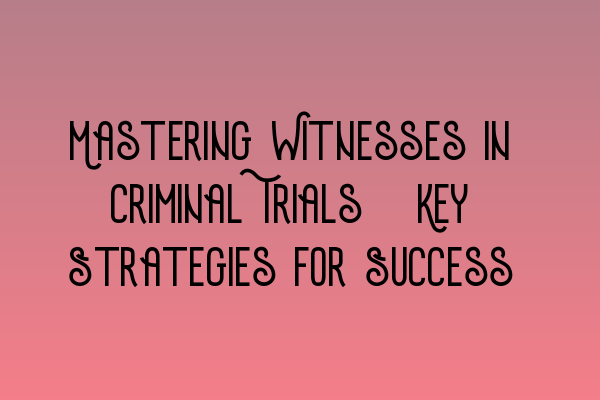Mastering Witnesses in Criminal Trials: Key Strategies for Success
Welcome to the blog of SQE Criminal Law & Practice Law UK, where we aim to provide you with valuable insights into criminal law and practice. In today’s post, we will discuss the importance of mastering witnesses in criminal trials and share key strategies for success.
1. Preparing Your Witness
One of the first steps in securing a successful outcome in a criminal trial is ensuring your witness is well-prepared. This involves conducting thorough interviews, gathering necessary documents, and discussing potential questions. By providing your witness with the necessary information and guidance, you can enhance their credibility and increase the chances of a favorable verdict.
To prepare your witness effectively, consider enrolling in our SQE 1 Preparation Courses where you’ll learn practical techniques and strategies to maximize witness preparation.
2. Building Rapport
Establishing a strong rapport with your witness is crucial for effective testimony. By building trust and confidence, you can ensure they feel comfortable and supported during the trial. This can be achieved through attentive listening, empathy, and clear communication.
Improving your communication skills is vital in building rapport. Our SQE 2 Preparation Courses offer comprehensive training in effective communication, helping you establish a connection with your witness and present their testimony convincingly.
3. Questioning Techniques
Mastering the art of questioning is key in eliciting the most accurate and helpful information from your witness. The use of open-ended questions allows the witness to provide detailed and relevant answers, while closed-ended questions can be used to establish specific facts.
For a comprehensive understanding of effective questioning techniques, we recommend taking a look at our related article on SQE 1 Practice Exam Questions. This resource provides valuable insight and practical examples to strengthen your questioning skills.
4. Handling Cross-Examination
Cross-examination can be a challenging aspect of a criminal trial. It requires careful preparation, quick thinking, and the ability to counter the opposing counsel’s strategies. By anticipating potential lines of cross-examination and developing effective rebuttals, you can protect the credibility of your witness.
As part of your preparation, consider practicing with our SQE 1 Practice Mocks FLK1 FLK2. These practice exams simulate real-life cross-examination scenarios, allowing you to refine your skills in a safe and supportive environment.
5. Presenting a Strong Closing Argument
Your closing argument is your final opportunity to persuade the court of your client’s innocence or mitigate the charges against them. It should summarize the key points of your witness’s testimony and highlight any inconsistencies or weaknesses in the opposing side’s case.
To ensure your closing argument is impactful, enroll in our SQE 2 Preparation Courses, which delve into the art of persuasive advocacy and help you craft compelling closing arguments.
By implementing these key strategies and consistently honing your skills, you can become a master at handling witnesses in criminal trials. Remember, preparation, communication, and effective advocacy are the pillars of success in the courtroom.
If you are interested in learning more about the SRA SQE Exam dates and other relevant information, please refer to our article on SRA SQE Exam Dates.
We hope you found this blog post insightful and informative. For more valuable resources and updates on criminal law and practice, stay tuned to our blog.
